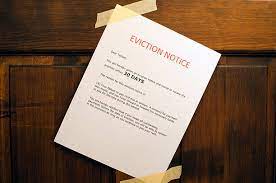
When faced with an unwanted tenant, writing an eviction letter can be a difficult and challenging task. An eviction letter is a formal document that officially notifies a tenant that they must vacate the premises. It’s important to make sure that your eviction letter is well-written and legally compliant to ensure that your tenant is properly informed of their obligations.
In this blog post, we’ll discuss the key elements of a well-crafted eviction letter and how to write one that will serve its purpose.
What is Eviction?
Eviction is the legal process of removing a tenant from a rental property. It occurs when the landlord believes that the tenant has violated the terms of their lease agreement, such as not paying rent, causing damage to the property, or engaging in illegal activities. Eviction is a last resort for landlords and is typically done when all other attempts to resolve the issue have failed.
When a landlord decides to initiate eviction proceedings, they must provide the tenant with an eviction notice, also known as an eviction letter. This notice serves as a formal written warning that the tenant must rectify the violation within a specified period or face eviction. It outlines the reasons for the eviction, the actions required to avoid eviction, and the consequences of non-compliance.
The eviction process varies depending on the country or state's laws and regulations. However, in general, the eviction process typically involves serving the tenant with an eviction letter, filing an eviction lawsuit in court, and obtaining a court order to forcibly remove the tenant if necessary.
Eviction can be a complex and emotional process for both landlords and tenants. Understanding the intricacies of eviction letters is essential for landlords to navigate this process successfully and ensure they follow the proper legal procedures. By adhering to these guidelines, landlords can effectively communicate their concerns to tenants and initiate the eviction process when necessary.
Understanding Eviction Letters
Eviction is a legal process through which a landlord removes a tenant from a rental property. An eviction letter is a formal written notice that informs the tenant of their violation of the terms of the lease agreement and the landlord's intent to terminate the tenancy.
An eviction letter serves as the first step in the eviction process and is a crucial document for both landlords and tenants. It communicates the seriousness of the situation and provides a legal basis for the eviction.
Understanding the purpose and significance of eviction letters is essential for both landlords and tenants. Landlords need to know how to properly draft an eviction letter to protect their rights and ensure a smooth eviction process. Tenants, on the other hand, should understand the reasons for receiving an eviction letter and the possible consequences if they fail to rectify the violation.
Eviction letters typically outline the specific violation or violations committed by the tenant, such as non-payment of rent, property damage, or illegal activities on the premises. The letter should clearly state the actions required to avoid eviction, such as paying the outstanding rent or fixing the damage caused.
Overall, understanding eviction letters is crucial in maintaining a fair and lawful relationship between landlords and tenants. It is important to approach the situation with knowledge and professionalism to ensure a successful resolution.
Reasons for Writing an Eviction Letter
There are several reasons why a landlord may need to write an eviction letter. The most common reason is due to non-payment of rent. If a tenant has not paid rent, the landlord has the right to evict them after a certain number of days, which can vary by state.
Other reasons for eviction may include damage to the property, violation of lease agreements, illegal activity on the property, or causing a disturbance to other tenants or neighbors.
It is important to note that landlords must have a valid legal reason for evicting a tenant and cannot do so based on discriminatory reasons, such as race, gender, or religion. It is also crucial for landlords to follow the proper legal procedures when issuing an eviction letter and throughout the eviction process to avoid any legal repercussions.
By understanding the reasons for eviction and the legal considerations involved, landlords can effectively communicate with their tenants and resolve any issues in a timely and appropriate manner.
Important Elements of an Eviction Letter
When writing an eviction letter, it is important to include certain key elements to ensure that it is clear, concise, and effective. Here are some of the most important elements that you should consider including in your eviction letter:
1. Date and Address: Begin your letter with the current date and include your name and address, as well as the name and address of the tenant(s) you are evicting.
2. Reason for Eviction: Clearly state the reason for the eviction in your letter. This could be non-payment of rent, violation of the lease agreement, or other serious issues.
3. Specifics of the Issue: Be specific about what the tenant(s) have done or failed to do that has led to the eviction.
4. Date for Vacating the Property: Provide a specific date by which the tenant(s) must vacate the property, in accordance with local laws and regulations.
5. Consequences of Non-Compliance: Clearly state what consequences the tenant(s) will face if they do not comply with the eviction order, such as legal action or the involvement of law enforcement.
By including these important elements in your eviction letter, you can help ensure that your message is clear and that the tenant(s) understand the severity of the situation.
Steps to Writing an Effective Eviction Letter
When it comes to writing an effective eviction letter, there are a few key steps to follow to ensure clarity and legality. Here are the steps you should take:
1. Clearly state the purpose: Start the letter by clearly stating that it is an eviction notice. This will eliminate any confusion and make your intentions clear from the beginning.
2. Include all necessary details: Provide all the necessary details in the letter, including the tenant's name, address, and the reason for eviction. Be specific and provide any supporting evidence or documentation if applicable.
3. Specify the timeline: Clearly state the deadline by which the tenant must vacate the premises. This will provide them with a clear understanding of the timeline and prevent any misunderstandings.
4. Mention consequences: Inform the tenant of the consequences if they fail to comply with the eviction notice. This could include legal action or additional fees that they may be responsible for.
5. Be professional and objective: Keep the tone of the letter professional and objective. Avoid using any personal or emotional language, as this may undermine the legality and effectiveness of the eviction letter.
6. Proofread and review: Before sending the letter, proofread it thoroughly to ensure there are no errors or inconsistencies. It's also a good idea to have someone else review it to catch any mistakes you may have missed.
By following these steps, you can ensure that your eviction letter is clear, concise, and legally sound. Remember, it's always best to consult with a legal professional to ensure that you are following all necessary procedures and adhering to local laws and regulations.
Sample Eviction Letter Template
When writing an eviction letter, it's important to ensure that the message is clear and direct. A sample eviction letter template can provide guidance on the necessary elements that should be included in an effective letter.
Dear [Tenant’s name],
I am writing to inform you that due to [reason for eviction], I must request that you vacate the premises located at [address] by [date]. This decision has been made in accordance with the terms of our lease agreement.
Please be aware that failure to vacate the premises by the specified date may result in legal action. Additionally, if any outstanding rent or damages remain unpaid, these charges will be pursued through the appropriate legal channels.
If you have any questions or concerns regarding this matter, please do not hesitate to contact me at [contact information]. I appreciate your cooperation in this situation.
Legal Considerations for Writing an Eviction Letter
When writing an eviction letter, it is important to consider the legal implications to ensure that it is legally valid and enforceable. Here are some key legal considerations to keep in mind:
1. Familiarize Yourself with Local Laws: Laws regarding eviction procedures can vary from state to state and even between different jurisdictions. It is crucial to thoroughly research and understand the specific laws and regulations that apply to your location.
2. Follow Proper Notice Periods: Most jurisdictions require landlords to provide a certain notice period before initiating eviction proceedings. This notice period typically varies depending on the reason for eviction and may range from a few days to several weeks. Failure to provide the correct notice period can result in your eviction case being dismissed.
3. Use Proper Language and Format: The eviction letter should clearly state the reason for eviction and include all relevant details such as the tenant's name, address, and lease agreement terms. It should be written in a professional manner, free from any discriminatory or inflammatory language. Using a formal tone and following a standard letter format can help ensure its legality.
4. Serve the Letter Correctly: It is essential to serve the eviction letter to the tenant using the proper method specified by local laws. Typically, this involves delivering the letter in person or sending it via certified mail with a return receipt requested. Be sure to keep proof of service in case it is needed for legal purposes.
5. Consult with an Attorney if Needed: If you are unsure about the legal aspects of writing an eviction letter, it is advisable to seek guidance from a qualified attorney. They can provide expert advice and help ensure that your eviction letter is legally sound.
By taking these legal considerations into account, you can increase the chances of your eviction letter being legally valid and enforceable. Remember to always prioritize following the correct legal procedures to protect your rights as a landlord.






















